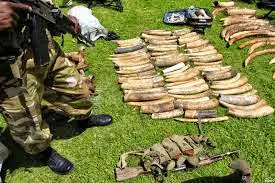The United States on Friday committed 600 million rand (about $54 million) to the fight against wildlife trafficking in Africa.
Of the funding, over 30 million rand (about $2.7 million) will be dedicated to helping wildlife organisations in South Africa, US Under-Secretary Catherine Novelli said in Pretoria.
In addition to the funding, US will also donate to South African park rangers 750,000 dollars worth of survival, surveillance and investigative equipment to support their efforts to combat poaching and illegal wildlife, said Novelli who was on a visit to South Africa.
These trailers will carry preventive equipment to crime scene, ensuring that rangers and environmental management inspectors have the tools they need to properly collect evidence, according to Novelli.
Novelli handed over two surveillance and investigative crime scene equipment carrying trailers to rangers in KwaZulu-Natal and Free State provinces.
The donation came as wildlife trafficking, particularly rhino poaching, was on the rise in Africa.
South Africa, home to more than 80 percent of the world's rhino population, bears the brunt of rhino poaching.
Since the start of the poaching in 2008, South Africa has lost over 2,600 rhinos -- a figure that, despite so much effort, increases daily, according to the Stop Rhino Poaching organization.
Sources: Xinhua - globaltimes.cn
16/11/14
--
-
Related:
Of the funding, over 30 million rand (about $2.7 million) will be dedicated to helping wildlife organisations in South Africa, US Under-Secretary Catherine Novelli said in Pretoria.
In addition to the funding, US will also donate to South African park rangers 750,000 dollars worth of survival, surveillance and investigative equipment to support their efforts to combat poaching and illegal wildlife, said Novelli who was on a visit to South Africa.
These trailers will carry preventive equipment to crime scene, ensuring that rangers and environmental management inspectors have the tools they need to properly collect evidence, according to Novelli.
Novelli handed over two surveillance and investigative crime scene equipment carrying trailers to rangers in KwaZulu-Natal and Free State provinces.
The donation came as wildlife trafficking, particularly rhino poaching, was on the rise in Africa.
South Africa, home to more than 80 percent of the world's rhino population, bears the brunt of rhino poaching.
Since the start of the poaching in 2008, South Africa has lost over 2,600 rhinos -- a figure that, despite so much effort, increases daily, according to the Stop Rhino Poaching organization.
Sources: Xinhua - globaltimes.cn
16/11/14
--
-
Related:
Interpol announces special team to combat illegal ivory trafficking
UN chief 'adopts' lion cub to support efforts against wildlife trafficking
Environment: Experts meet to discuss how to better fight wildlife trafficking in the EU and globally
More than 40 countries sign declaration on fighting with illegal trade in wildlife







 GR
GR FR
FR DE
DE ES
ES IT
IT RU
RU EU
EU